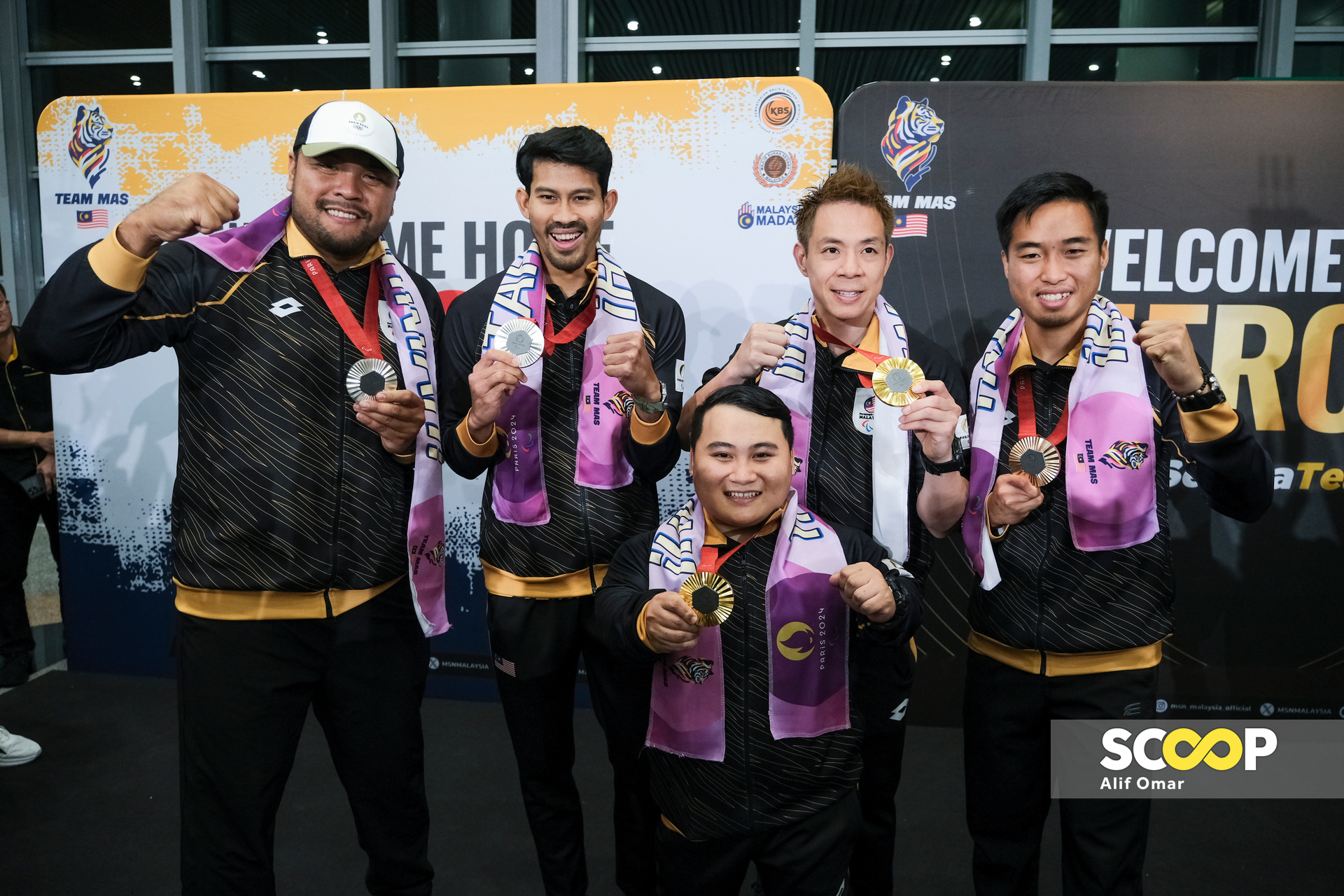KUALA LUMPUR — The year’s end marks another Olympic cycle’s conclusion. Yet again, Malaysia continues waiting for the elusive gold medal at the world’s greatest sporting event.
As we anticipate a fresh start and a new Olympic cycle leading to the 2028 Los Angeles Games, let us reflect on the notable highs, lows, and controversies that defined Malaysian sports in 2024.
Achieving greater success requires concerted efforts from all stakeholders, including the Youth and Sports Ministry, the National Sports Council, the National Sports Institute, the Olympic Council of Malaysia, the Paralympic Council of Malaysia, the National Sports Associations, and the athletes themselves.
2024 Malaysian Sports Recap: The Highs, Lows, and Controversies

Football
In January, Prime Minister Datuk Seri Anwar Ibrahim allocated RM5 million for national football development, lauding Harimau Malaya’s fighting spirit at the 2023 Asia Cup.
Tragedy struck in May when national player Faisal Halim was the victim of a malicious acid attack at a mall, carried out by unidentified assailants.
In July, South Korean coach Kim Pan-gon resigned as the head coach of Harimau Malaya, with the Football Association of Malaysia appointing Australian Peter Cklamovski as his successor later in the year.
Prime Minister Anwar later pledged an additional RM15 million for national football teams under Budget 2025.
Malaysia failed to reach the semi-finals of the Asean Cup after finishing third in Group A. With one defeat, two draws, and a single win, Harimau Malaya ended their campaign behind defending champions Thailand and Singapore.

Badminton
Ng Tze Yong’s year was plagued by injury, beginning with a back issue that forced him to withdraw from the Malaysia Open in January and ultimately ruled him out of the Paris Olympics.
Independent shuttler Lee Zii Jia stirred controversy after demanding appearance fees from BAM for the Thomas Cup Finals. Later in the year, he faced backlash for wearing a jersey with an upside-down Jalur Gemilang during the World Tour Finals in December.
Men’s doubles duo Aaron Chia and Soh Wooi Yik retained their Olympic bronze medals, while Zii Jia also secured bronze in Paris under coach Wong Tat Meng.
Meanwhile, independents Goh Sze Fei and Nur Izzuddin had an exceptional year, winning titles at the Super 750 Japan Open, Super 1000 China Open, and Super 500 Arctic Open. Their achievements saw them surpass Aaron and Wooi Yik as Malaysia’s top men’s doubles pair.
BAM faced corruption investigations by the Malaysian Anti-Corruption Commission (MACC) and introduced significant coaching changes, including the appointment of Denmark’s Kenneth Jonassen to lead the singles department.
Additionally, Team LZJ named former international Yeoh Kay Bin as their new head coach after Wong Tat Meng’s departure.

Cycling
Malaysia’s hopes for an Olympic medal in cycling were dashed when Pocket Rocketman Datuk Azizulhasni Awang was disqualified from the men’s keirin event (heat one), while Shah Firdaus Sahrom was relegated to sixth place in the final at the Paris Olympics.
Azizulhasni later announced his retirement but hinted at continuing for another two years.

Diving
Malaysian diving faced a significant setback as Datuk Pandelela Rinong and Nur Dhabitah Sabri failed to qualify directly for the Paris Olympics.
Bertrand Rhodict Lises, the sole diver to qualify for the men’s 10m platform, finished 25th out of 26 divers.
Dhabitah eventually competed through an unused quota and finished 12th in the women’s 3m springboard event.

Hockey
Malaysia’s failure to qualify for the Paris Olympics led to the non-renewal of head coach A. Arul Selvaraj’s contract. Sarjit Singh was appointed as his replacement.
However, while the national teams struggled to make an impact, the junior team redeemed themselves by reaching the Asia Junior Cup last four and secured qualification for next year’s Junior World Cup. This was after a disappointing showing at the Sultan of Johor Cup (SOJC).

Weightlifting
Aniq Kasdan narrowly missed out on an Olympic bronze medal in Paris by just one kilogram in the men’s 61kg category. However, he bounced back strongly, winning gold at the Commonwealth Championships in Fiji and two silvers at the World Championships in Bahrain.
Aniq now aims to compete in the 60kg category next year, with the goal of achieving a total lift of 300kg.

Bowling
Malaysia excelled at the Asian Championships in Bangkok, claiming eight golds, five silvers, and four bronzes to emerge as overall champions.
Sin Li Jane made history by winning four US Professional Women’s Bowling Association (PWBA) titles and becoming the first Asian to be named the circuit’s Player of the Year.

Athletics
In October, Zaidatul Husniah Zulkifli broke G. Shanti’s 31-year-old national 100m record, clocking 11.49 seconds at the Perlis Open.
Meanwhile, sprinter Azeem Fahmi represented Malaysia at the Paris Olympics on a wildcard ticket. Although he qualified for the first round after finishing second in the preliminaries, his time of 10.45 seconds was far from his personal best of 10.09 seconds, and he finished last in his heat.

Sepak Takraw
Malaysia achieved historic success at the Sepak Takraw World Cup in Titiwangsa, winning their first-ever gold medals in the doubles and regu events since the tournament’s inception in 2011.

Silat
V. Thamaraj made history by becoming the first Malaysian Indian to win gold at the World Pencak Silat Championships in Abu Dhabi, breaking the stereotype that silat is exclusively a Malay sport.
Overall, Malaysia secured six gold medals, nine silvers, and four bronzes, while the junior squad added five golds, four silvers, and four bronzes to the tally.

Silambam
The Malaysian silambam team won 12 golds to claim the overall title at the Asian Open Silambam Championship in Qatar.
Gold medalists include Prakash (men’s open above 60kg), Shastivena (girls’ under-17, 55kg-65kg), and Leenasree, Kavithira, Darnisha, and Ranishaa in the girls’ under-15 categories.
Para Games
Malaysia shone at the Paralympics, with Cheah Liek Hou becoming the first badminton player to defend a Paralympic gold medal.
Bonnie Bunyau Gustin smashed his own world record to win gold in powerlifting, while Ziyad Zolkefli and Abdul Latif Romly added silvers, and Eddy Bernard claimed a bronze.
After the Paralympics, PCM president Datuk Seri Megat D. Shahriman Zaharudin revealed that Malaysia’s para-athletes were served meals from a supplier tied to the banned Al-Arqam-linked GISBH, accused of abuse and exploitation.
In mid-December, Megat retained his top spot after defeating former NSC director-general Datuk Ahmad Shapawi Ismail in the presidential election at the PCM AGM in December.
Other Developments
The government allocated a total of RM230 million for sports development under Budget 2025. This includes RM10 million for the Road to Gold (RTG) initiative and RM20 million for esports.
However, Malaysia’s medal hopes for the 2026 Glasgow Commonwealth Games were dampened following the omission of badminton, hockey, diving, squash, cricket, shooting, table tennis, wrestling, beach volleyball, rhythmic gymnastics, mountain biking, road cycling, and triathlon.
As 2024 comes to a close, the highs and lows of Malaysian sports serve as a reminder of the work that lies ahead. The road to the 2028 Los Angeles Olympics begins now, and it is one paved with both challenges and opportunities. — December 30, 2024


